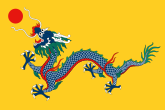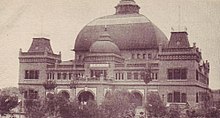Consultative Bureau
Consultative Bureau | |
|---|---|
 Flag of the Qing Empire | |
| Type | |
| Type | Provincial advisory bodies of Qing |
| History | |
| Founded | 1909 |
| Disbanded | By 1913 |
| Succeeded by | Provincial Assemblies of Republic of China |
| Elections | |
Last election | April – June 1909 |
| Meeting place | |
 | |
| One of Consultative Bureaux in Shunzhi | |
| Rules | |
| Regulation of the Consultative Bureau | |
| Provincial Assemblies | |||||||||
|---|---|---|---|---|---|---|---|---|---|
| Traditional Chinese | 省諮議局 | ||||||||
| Simplified Chinese | 省谘议局 | ||||||||
| |||||||||
Consultative Bureau[1] (simplified Chinese: 咨议局; traditional Chinese: 諮議局) was a provincial advisory institution established in 1909 in each province during the Constitutional Movement in the late Qing Dynasty.
According to the Regulation of the Consultative Bureau, the meetings of the Bureau were divided into two types: regular meetings and temporary meetings.[2]
Overview[edit]
The Consultative Bureau was the local institution of the Advisory Council,[3] and it had a Speaker and two Deputy Speakers.
Except for Xinjiang, all provinces announced the establishment of Consultative Bureaus sequentially.[4] In total, there were 21 Consultative Bureaus throughout the Qing Dynasty.[5]
From March 1909, each province began to elect members of the Consultative Bureau one after another.[6] On October 14, with the exception of Xinjiang, all 21 provincial Consultative Bureaus were established and opened as scheduled, with more than 1,670 members elected.[7]
The election of members of the Consultative Bureau is the first election of public opinion representatives in the history of China.[8]
See also[edit]
References[edit]
- ^ Jinfan Zhang (20 February 2014). The Tradition and Modern Transition of Chinese Law. Springer. pp. 593–. ISBN 978-3-642-23266-4.
- ^ 20th Century Chinese Constitutionalism. Wuhan University Press. 2002. pp. 30–. ISBN 978-7-307-03488-4.
- ^ Shao Jian (2018). A Time of Regression: From Liang Qichao's Constitutionalism to the Democracy of the New Youth. Independent Writers Press. pp. 38-. ISBN 978-986-326-605-1.
- ^ "Modernizing Features of Constitutional Reform in the Late Qing Dynasty". Sohu. 2013-05-07.
- ^ Zhang Jinfan (2003). Modern Chinese Society and Legal Civilization. China University of Political Science and Law Press. pp. 223–. ISBN 978-7-5620-2482-8.
- ^ Founding of the Republic of China. Zhonghua Book Company. 1981. pp. 87–.
- ^ Li Renkai (1996). Modern Chinese Social Thought. Henan People's Publishing House. pp. 223–. ISBN 978-7-215-03482-2.
- ^ "The short-lived "Consultative Bureau"". People's Daily. 2013-09-16.
